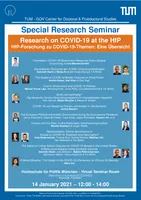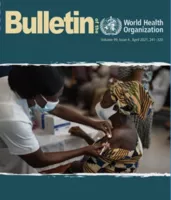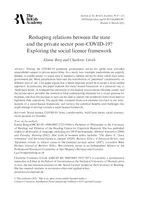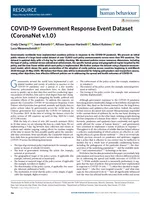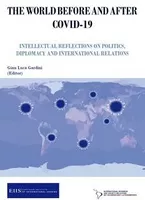COVID-19-Forschung an der HfP und der TUM School of Governance
Eine Übersicht
Schon bevor die WHO am 11. März 2020 COVID-19 zu einer Pandemie erklärt hat, haben die Sozialwissenschafler*innen der Hochschule für Politik begonnen, politische und sozioökonomische Konsequenzen der sich rapide ausbreitenden Virus-Erkrankung zu erforschen. Zu den ersten COVID-Projekten an der HfP gehört das CoronaNet-Projekt (inzwischen ein wichtiger Teil des H2020-PERISCOPE-Konsortiums), was Informationen darüber sammelt, wie Regierungen in aller Welt auf die Pandemie reagieren. Dank eines Netzwerks von mehr als 600 Personen in 18 Zeitzonen, die zu dem Projekt beitragen, werden diese Informationen täglich aktualisiert und durch systematische Kodierung vergleichbar und für die COVID-19-Forschung nutzbar gemacht.
Eine große Zahl weiterer Projekte an einer Vielzahl von Professuren, Lehrstühlen und Forschungsgruppen der HfP/GOV haben sich seither im Jahr 2020 und 2021 mit politischen, ökonomischen, epidemiologischen und sonstigen gesundheitlichen, sozialen sowie ökologischen Auswirkungen von COVID-19 sowie mit den Ursachen des Verlaufs der Pandemie beschäftigt.
11 laufende Projekte zu COVID-19 Themen wurden in einer Sonderveranstaltung des TUM-GOV Research Seminars am 14. Januar 2021 vorgestellt. Seitdem sind einige dieser (und auch andere) HfP-Forschungsprojekte zu COVID-Themen abgeschlossen bzw. z.T. schon publiziert worden. Diese Seite bietet einen Überblick in umgekehrt chronologischer Reichenfolge (neueste Forschung zuerst):
We conducted a representative online survey with partnered women (18–65 years) between 22 April and 8 May 2020, when participants had been under lockdown for a month. We determined the prevalence of several forms of violence within the previous month using both direct elicitation and a list experiment. Of our 3818 survey respondents, 118 (3.09%) reported incidents of physical conflict, 293 (7.67%) reported emotional abuse and 97 (6.58%) reported child corporal punishment. We estimated that 3.57% had non- consensual intercourse with their partner. Our regression analysis revealed an increased risk of physical conflict with home quarantine, financial worries, poor mental health and young (< 10 years) children; we obtained similar results for other forms of violence. Awareness and use of pertinent support services was low. Our findings of an increased risk of domestic violence during the pandemic should prompt policy-makers to improve the safety of women and children. Interventions to alleviate risks factors and extend support services are required.
During the COVID-19 pandemic governments across the globe have provided unparalleled support to private sector firms. As a result, new oversight mechanisms are urgently needed, to enable society to assess and, if necessary, redress, moves by firms which have taken government aid. Many jurisdictions have seen the introduction of ‘piecemeal’ conditionality on different pots of aid. This paper argues that a better response would be to adopt a more unified approach. In particular, the paper explores the social licence framework as a potential way to ‘build back better’. It is argued that the nature of the implicit social contract between society and the private sector provides the normative force underpinning demands for a social purpose for business, and that this purpose in turn can be used to specify the conditions firms must meet to legitimise their operations. The paper then considers three core elements involved in any introduction of a social licence framework, and surveys the potential benefits and challenges that might emerge in moving towards a social licence framework.
Governments worldwide have implemented countless policies in response to the COVID-19 pandemic. We present an initial public release of a large hand-coded dataset of over 13,000 such policy announcements across more than 195 countries. The dataset is updated daily, with a 5-day lag for validity checking. We document policies across numerous dimensions, including the type of policy, national versus subnational enforcement, the specific human group and geographical region targeted by the policy, and the time frame within which each policy is implemented. We further analyse the dataset using a Bayesian measure- ment model, which shows the quick acceleration of the adoption of costly policies across countries beginning in mid-March 2020 through 24 May 2020. We believe that these data will be instrumental for helping policymakers and researchers assess, among other objectives, how effective different policies are in addressing the spread and health outcomes of COVID-19.
Tim Buthe, Luca Messerschmidt, and Cindy Cheng.
"Policy responses to the coronavirus in Germany."
The World Before and After COVID-19:
Intellectual Reflections on Politics, Diplomacy and
International Relations, Gian Luca Gardini (ed).
Stockholm–Salamanca: European Institute of
International Relations (2020).
Faced with major crises, policymakers are at risk of various pathologies Even in the absence of such pathologies, governments, when faced with a major crisis such as the COVID-19 pandemic, have strong incentives to try to go it alone at the national level: Both policy implementation and political accountability still mostly take place at the national level. Federal political systems, such as Germany, face similar challenges at the sub-national level. At the same time, Louis Brandeis' classic depiction of U.S. states as "laboratories of democracy" reminds us that federalism offers opportunities for trying different policy responses and learning from the differing results, especially when federalism has "experimentalist" characteristics to encourage feedback and learning. We provide a brief overview of the public and political discourse in Germany, as well as the German federal and state-level policy responses, during the first months of the pandemic and an early, tentative assessment of commonalities, divergence, pathologies, and learning – as well as broader implications for conflict and cooperation in Europe and beyond.
